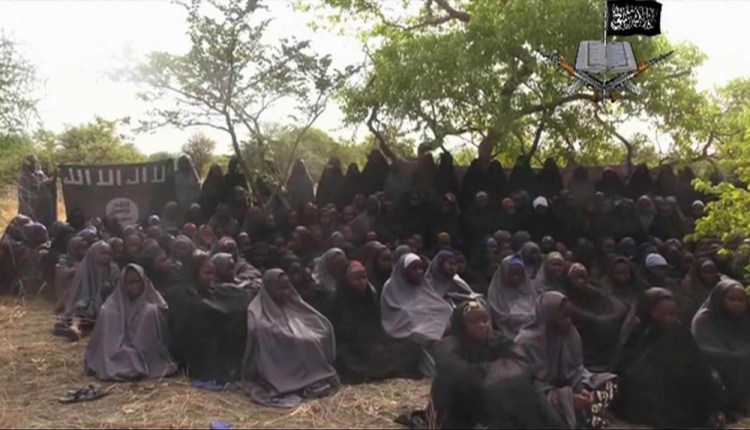LAGOS, Nigeria – Hundreds of people marched in Nigeria’s main cities on Thursday to demand the safe return of girls who were abducted by Boko Haram extremists two years ago from a school in the northeastern town of Chibok.
The protests happened a day after CNN broadcast parts of a Boko Haram video of girls wearing the Islamic hijab, and its own images of tearful mothers, including one reaching out to a computer screen as she recognized her kidnapped daughter.
A schoolmate says she cried with joy when she saw the video appearing to show some of the kidnapped Chibok girls.
In a statement Thursday, she thanked God that they are alive and named some of her friends among them – Saratu Ayuba, Jummai Mutah, and Kwazigu Hamman.
The young woman, who now calls herself Saa and is going to college in the United States, was among several dozen who escaped, jumping down from the back of an open truck after the Islamic extremists of Boko Haram had kidnapped them. The extremists seized 276 girls who had gathered for science exams at the Government Girls Secondary School in the northeast town of Chibok. A total of 219 remain missing.
Saa, who has changed her name to escape the stigma of those called “Boko Haram wives” even though she escaped within hours, spoke in a statement through the Education Must Continue Initiative. It is a Washington-based project started by Nigerian Emmanuel Ogede which is sponsoring the education of Saa and nine other students who escaped.
She said seeing her friends gives her courage to urge the world not to lose hope and to raise their voices to campaign for #BringBackOurGirls and demand Nigeria’s government takes action.
The video shows 15 of the girls – one with a mischievous grin, one looking uncompromising, downright defiant, and one downcast. One can feel the pain that shows in the eyes of many of them. They give the date as Christmas, Dec. 25, 2015.
While Boko Haram is thought to have abducted thousands of people over the years, the mass abduction brought the extremist group to the world’s attention. The campaign hashtag #BringBackOurGirls went as far as the White House, used by U.S. first lady Michelle Obama.
CNN reported that the video was sent in December to negotiators trying to free the girls. CNN’s report included Information Minister Lai Mohammed saying the government is reviewing and assessing the video, which it apparently demanded as “proof of life” from Boko Haram.
Senator Shehu Sani, who has been involved in past negotiations with Boko Haram about the Chibok girls, told The Associated Press he found the video credible. Yakubu Nkeki, leader of a support group of parents of the kidnapped girls, said he briefly saw part of the CNN video, in between power blackouts frequent in Nigeria, and “those are definitely our girls.”
There’s been no word from the Chibok girls since May 2014, when Boko Haram leader Abubakar Shekau said they had converted to Islam and threatened to sell them into slavery or forced marriage with his fighters.
Nigeria’s Vice President Yemi Osinbajo was expected in Chibok on Thursday for the anniversary of the kidnappings, Nkeki said, complaining the issue has become politicized. He said the community is angry that their only school remains in the ruins created by Boko Haram, which firebombed buildings as they took off with the girls.
Some 20,000 children in the town and its surroundings have no school to attend, he said Thursday as parents gathered at the school to pray for the safe return of their daughters.
“Boko Haram has achieved its aim. They say they don’t want us to have Western education and our children don’t,” Nkeki said.
Send questions/comments to the editors.



Success. Please wait for the page to reload. If the page does not reload within 5 seconds, please refresh the page.
Enter your email and password to access comments.
Hi, to comment on stories you must . This profile is in addition to your subscription and website login.
Already have a commenting profile? .
Invalid username/password.
Please check your email to confirm and complete your registration.
Only subscribers are eligible to post comments. Please subscribe or login first for digital access. Here’s why.
Use the form below to reset your password. When you've submitted your account email, we will send an email with a reset code.